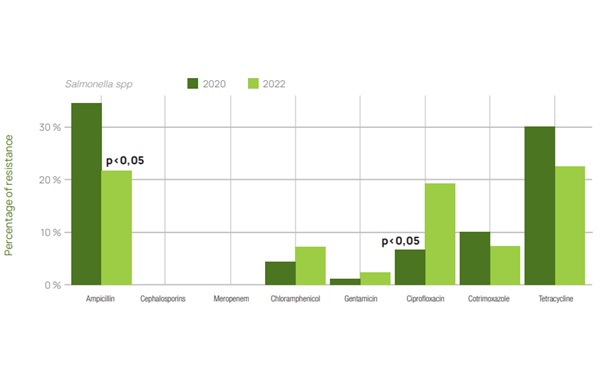 In salmonellosis, there was a significant decrease in ampicillin resistance and a significant increase in fluoroquinolone resistance from 2020 to 2022;
Credit: 'Monitoring Antibiotic Consumption, Antibiotic Resistance, and the Presence of Antibiotic Residues in Luxembourg' report
In salmonellosis, there was a significant decrease in ampicillin resistance and a significant increase in fluoroquinolone resistance from 2020 to 2022;
Credit: 'Monitoring Antibiotic Consumption, Antibiotic Resistance, and the Presence of Antibiotic Residues in Luxembourg' report
On Thursday 18 July 2024, a report on the monitoring of antibiotic consumption, antibiotic resistance and the presence of antibiotic residues in Luxembourg was published for the first time.
The report took stock of the situation in Luxembourg by compiling the most recent national data on human health, animal health and the presence of antibiotic residues in the environment.
According to the World Health Organization (WHO), antibiotic resistance is one of the most serious threats to global health, affecting both humans and animals. The European Centre for Disease Control and Prevention (ECDC) estimates that the number of human deaths resulting from infections caused by antibiotic-resistant bacteria is more than 35,000 each year in the European Union, Iceland and Norway.
As part of the Luxembourg National Antibiotic Plan (NAP) 2018-2022, extended until 2024, the objective of reducing the emergence, development and transmission of antibiotic resistance in Luxembourg was addressed using a global "One Health" approach that targets three sectors in particular: human health, animal health and the environment.
The Health Directorate and the Luxembourg Veterinary and Food Administration (ALVA) noted they were particularly involved in the implementation of this plan, both in the National Antibiotic Committee and in the various working groups set up to meet the objectives set.
This technical report was written by the NAP "surveillance" working group and compiles the three themes of the "One Health" approach, the most recent national data concerning: the consumption of antibiotics in human and animal health, antibiotic resistance in human health, animal health and in foodstuffs as well as the presence of antibiotic residues in foodstuffs, in animal feed and surface water.
Analysis and recommendations for use
Based on the data collected, the "human health" component encourages the use of "Access" category antibiotics from the WHO's AWaRe classification. These antibiotics, which have lower resistance potential, are recommended as first-line treatments. "Watch" category antibiotics should be used only in specific situations because they are more likely to lead to resistant bacteria. "Reserve" antibiotics should be used strictly according to guidelines and, if possible, in a targeted way.
The report also showed a significant increase in salmonella resistance to fluoroquinolones, a type of broad-spectrum antibiotic, between 2020 and 2022. The Health Directorate recommended using these antibiotics cautiously.
Regarding the "animal health" component, the first recommendation was to improve the procedure for recording data on the prescription and administration of antibiotics by veterinarians for large animals in the European database.
Regarding the "environmental" component, the report noted that antibiotic residues were found in surface water. Between 2016 and 2022, some residues were detected in low concentrations. However, their impact on health has not been assessed because there are no established environmental quality standards yet, and only a few residue analyses have been done. These standards are still being discussed at the European level.
The Health Directorate also took this opportunity to remind users to return unused antibiotics to the pharmacy or recycling centre and especially not to throw them in sinks and toilets, because treatment plants do not systematically eliminate these molecules.
Upcoming actions
World Antimicrobial Resistance (AMR) Awareness Week will take place from 17 to 24 November 2024. During this week, 18 November will mark European Antibiotic Awareness Day and will present the international initiative aimed at raising awareness among the public, health professionals and pet owners about the ever-increasing risks associated with the inappropriate use of antibiotics.
The "Monitoring report on antibiotic consumption, antibiotic resistance and the presence of antibiotic residues in Luxembourg" and the factsheet presenting the report’s key figures are available at: sante.lu/pna.
For more information on antibiotic resistance, visit the European Commission's website (https://health.ec.europa.eu/antimicrobial-resistance/eu-action-antimicrobial-resistance_fr), the WHO's website (https://www.who.int/fr/news-room/fact-sheets/detail/antibiotic-resistance), and the European Centre for Disease Control and Prevention's website (https://www.ecdc.europa.eu/en/news-events/eaad-2022-launch).








